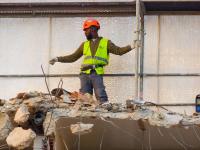 What I seek in these encounters with overseas veterans is something I am unable to translate into a simple, telegraphic formula. Among these veterans there is a very strong sense of community, an almost familiar, almost tribal communion, which at certain times seems to me incompatible with a broader sense of community. It is a communion that tends to exclude me and all those who have not shared the same experience. What I seek in these conversations are the moments, similar to epiphanies, when veterans express belonging to a larger, more comprehensive human community, necessarily organized around moral values.
What I seek in these encounters with overseas veterans is something I am unable to translate into a simple, telegraphic formula. Among these veterans there is a very strong sense of community, an almost familiar, almost tribal communion, which at certain times seems to me incompatible with a broader sense of community. It is a communion that tends to exclude me and all those who have not shared the same experience. What I seek in these conversations are the moments, similar to epiphanies, when veterans express belonging to a larger, more comprehensive human community, necessarily organized around moral values.
To read
13.12.2020 | by Paulo Faria
 “If it hadn’t been for World War II, African countries wouldn’t have been able to liberate themselves from colonial empires”. This observation, made by Mamadou Diouf – a Senegal-born Pole, activist and legend of the Warsaw music scene, during a debate organized in June 2019 as part of the 30th Malta Festival in Poznań seems to be a provocation rather than an objective statement of facts. The average Pole is unable to imagine that this cruel conflict, which began in Poland, could bring anything positive for humanity. In a country so profoundly affected by this war, Diouf’s statement is surprising, almost shocking.
“If it hadn’t been for World War II, African countries wouldn’t have been able to liberate themselves from colonial empires”. This observation, made by Mamadou Diouf – a Senegal-born Pole, activist and legend of the Warsaw music scene, during a debate organized in June 2019 as part of the 30th Malta Festival in Poznań seems to be a provocation rather than an objective statement of facts. The average Pole is unable to imagine that this cruel conflict, which began in Poland, could bring anything positive for humanity. In a country so profoundly affected by this war, Diouf’s statement is surprising, almost shocking.
Afroscreen
20.10.2020 | by Katarzyna Cytlak
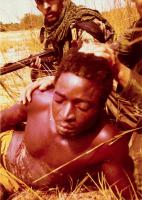 ‘The Missing Face’ is a powerful reflection on the war, and above all on the ownership of traumatic experiences of conflict, specifically at the end of Portuguese colonialism in Africa.
‘The Missing Face’ is a powerful reflection on the war, and above all on the ownership of traumatic experiences of conflict, specifically at the end of Portuguese colonialism in Africa.
To read
12.11.2019 | by Felipe Cammaert
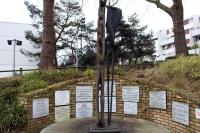 The difficult subject of a politically null war and the traumatic end of the imperial cycle have tended to produce a memory of the colonial war which – though often stressing its “tragic” and “useless” dimension – still emphasizes participation in it as a question of duty. This casts the figure of the veteran as a victim, either of the “winds of history”, or as having been forced to fight.
The difficult subject of a politically null war and the traumatic end of the imperial cycle have tended to produce a memory of the colonial war which – though often stressing its “tragic” and “useless” dimension – still emphasizes participation in it as a question of duty. This casts the figure of the veteran as a victim, either of the “winds of history”, or as having been forced to fight.
To read
16.06.2019 | by Miguel Cardina
 Whether in terms of its officially ensconced denial or the radical geopolitical reformulation of Portugal after decolonization, the Colonial War remains historiographically unresolved. The experience of participation in the war is one of the most repressed and complex, but also one of the most tragic, events of Portuguese contemporary life, and it continues to resonate today.
Whether in terms of its officially ensconced denial or the radical geopolitical reformulation of Portugal after decolonization, the Colonial War remains historiographically unresolved. The experience of participation in the war is one of the most repressed and complex, but also one of the most tragic, events of Portuguese contemporary life, and it continues to resonate today.
To read
30.03.2019 | by Margarida Calafate Ribeiro
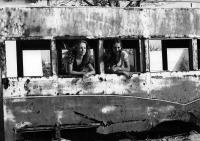 The distance between the writer and the traumatic reality about which they write determines the result of literary attempts to convey the experience of violence. Nevertheless, there are similarities between the artistic representations of memory offered by direct witnesses of events and those re-elaborated by their descendants (those we call post-memories).
The distance between the writer and the traumatic reality about which they write determines the result of literary attempts to convey the experience of violence. Nevertheless, there are similarities between the artistic representations of memory offered by direct witnesses of events and those re-elaborated by their descendants (those we call post-memories).
To read
24.02.2019 | by Felipe Cammaert
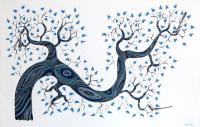 Now, forty-four years after the end of the War, for the former combatants who celebrate it in Belém, June 10 is, above all, a day when those who once fought together in Africa pay tribute to their comrades who died there. This year the meeting was celebrated for the 25th time. The same format unfolded: interfaith ceremony; speeches; a message from the President (in the Azores for other celebrations); parades, a cortège and the laying of flowers. Adriano Moreira did not speak, but he was a guest of honour. This tribute to the war-dead stages the consensus on which the meeting itself has always relied.
Now, forty-four years after the end of the War, for the former combatants who celebrate it in Belém, June 10 is, above all, a day when those who once fought together in Africa pay tribute to their comrades who died there. This year the meeting was celebrated for the 25th time. The same format unfolded: interfaith ceremony; speeches; a message from the President (in the Azores for other celebrations); parades, a cortège and the laying of flowers. Adriano Moreira did not speak, but he was a guest of honour. This tribute to the war-dead stages the consensus on which the meeting itself has always relied.
To read
13.07.2018 | by Fátima da Cruz Rodrigues
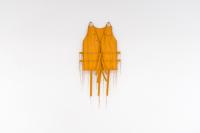 I said to one of them, who was very injured, “The troops can’t do anything for you, what do you want before you die?” He asked for water, I told the soldier to fetch water but gave him a signal not to go, that it wouldn’t be necessary. I picked up an FBP submachine gun, which wasn’t reliable, and fired a shot to kill him, but he stepped to the side.
I said to one of them, who was very injured, “The troops can’t do anything for you, what do you want before you die?” He asked for water, I told the soldier to fetch water but gave him a signal not to go, that it wouldn’t be necessary. I picked up an FBP submachine gun, which wasn’t reliable, and fired a shot to kill him, but he stepped to the side.
Mukanda
25.06.2018 | by Vasco Luís Curado
 What I seek in these encounters with overseas veterans is something I am unable to translate into a simple, telegraphic formula. Among these veterans there is a very strong sense of community, an almost familiar, almost tribal communion, which at certain times seems to me incompatible with a broader sense of community. It is a communion that tends to exclude me and all those who have not shared the same experience. What I seek in these conversations are the moments, similar to epiphanies, when veterans express belonging to a larger, more comprehensive human community, necessarily organized around moral values.
What I seek in these encounters with overseas veterans is something I am unable to translate into a simple, telegraphic formula. Among these veterans there is a very strong sense of community, an almost familiar, almost tribal communion, which at certain times seems to me incompatible with a broader sense of community. It is a communion that tends to exclude me and all those who have not shared the same experience. What I seek in these conversations are the moments, similar to epiphanies, when veterans express belonging to a larger, more comprehensive human community, necessarily organized around moral values.  “If it hadn’t been for World War II, African countries wouldn’t have been able to liberate themselves from colonial empires”. This observation, made by Mamadou Diouf – a Senegal-born Pole, activist and legend of the Warsaw music scene, during a debate organized in June 2019 as part of the 30th Malta Festival in Poznań seems to be a provocation rather than an objective statement of facts. The average Pole is unable to imagine that this cruel conflict, which began in Poland, could bring anything positive for humanity. In a country so profoundly affected by this war, Diouf’s statement is surprising, almost shocking.
“If it hadn’t been for World War II, African countries wouldn’t have been able to liberate themselves from colonial empires”. This observation, made by Mamadou Diouf – a Senegal-born Pole, activist and legend of the Warsaw music scene, during a debate organized in June 2019 as part of the 30th Malta Festival in Poznań seems to be a provocation rather than an objective statement of facts. The average Pole is unable to imagine that this cruel conflict, which began in Poland, could bring anything positive for humanity. In a country so profoundly affected by this war, Diouf’s statement is surprising, almost shocking.  ‘The Missing Face’ is a powerful reflection on the war, and above all on the ownership of traumatic experiences of conflict, specifically at the end of Portuguese colonialism in Africa.
‘The Missing Face’ is a powerful reflection on the war, and above all on the ownership of traumatic experiences of conflict, specifically at the end of Portuguese colonialism in Africa.  The difficult subject of a politically null war and the traumatic end of the imperial cycle have tended to produce a memory of the colonial war which – though often stressing its “tragic” and “useless” dimension – still emphasizes participation in it as a question of duty. This casts the figure of the veteran as a victim, either of the “winds of history”, or as having been forced to fight.
The difficult subject of a politically null war and the traumatic end of the imperial cycle have tended to produce a memory of the colonial war which – though often stressing its “tragic” and “useless” dimension – still emphasizes participation in it as a question of duty. This casts the figure of the veteran as a victim, either of the “winds of history”, or as having been forced to fight.  Whether in terms of its officially ensconced denial or the radical geopolitical reformulation of Portugal after decolonization, the Colonial War remains historiographically unresolved. The experience of participation in the war is one of the most repressed and complex, but also one of the most tragic, events of Portuguese contemporary life, and it continues to resonate today.
Whether in terms of its officially ensconced denial or the radical geopolitical reformulation of Portugal after decolonization, the Colonial War remains historiographically unresolved. The experience of participation in the war is one of the most repressed and complex, but also one of the most tragic, events of Portuguese contemporary life, and it continues to resonate today.  The distance between the writer and the traumatic reality about which they write determines the result of literary attempts to convey the experience of violence. Nevertheless, there are similarities between the artistic representations of memory offered by direct witnesses of events and those re-elaborated by their descendants (those we call post-memories).
The distance between the writer and the traumatic reality about which they write determines the result of literary attempts to convey the experience of violence. Nevertheless, there are similarities between the artistic representations of memory offered by direct witnesses of events and those re-elaborated by their descendants (those we call post-memories).  Now, forty-four years after the end of the War, for the former combatants who celebrate it in Belém, June 10 is, above all, a day when those who once fought together in Africa pay tribute to their comrades who died there. This year the meeting was celebrated for the 25th time. The same format unfolded: interfaith ceremony; speeches; a message from the President (in the Azores for other celebrations); parades, a cortège and the laying of flowers. Adriano Moreira did not speak, but he was a guest of honour. This tribute to the war-dead stages the consensus on which the meeting itself has always relied.
Now, forty-four years after the end of the War, for the former combatants who celebrate it in Belém, June 10 is, above all, a day when those who once fought together in Africa pay tribute to their comrades who died there. This year the meeting was celebrated for the 25th time. The same format unfolded: interfaith ceremony; speeches; a message from the President (in the Azores for other celebrations); parades, a cortège and the laying of flowers. Adriano Moreira did not speak, but he was a guest of honour. This tribute to the war-dead stages the consensus on which the meeting itself has always relied.  I said to one of them, who was very injured, “The troops can’t do anything for you, what do you want before you die?” He asked for water, I told the soldier to fetch water but gave him a signal not to go, that it wouldn’t be necessary. I picked up an FBP submachine gun, which wasn’t reliable, and fired a shot to kill him, but he stepped to the side.
I said to one of them, who was very injured, “The troops can’t do anything for you, what do you want before you die?” He asked for water, I told the soldier to fetch water but gave him a signal not to go, that it wouldn’t be necessary. I picked up an FBP submachine gun, which wasn’t reliable, and fired a shot to kill him, but he stepped to the side. 
